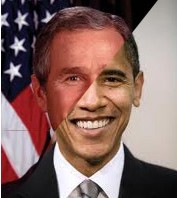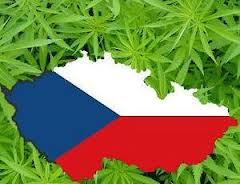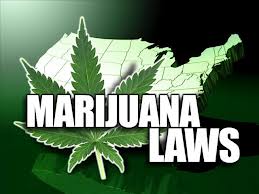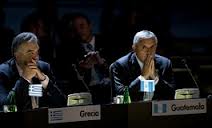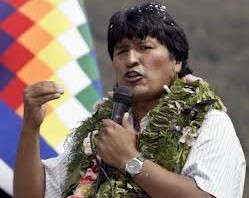Guatemala has been particularly affected by the War on Drugs because of its location on the most transited drug trafficking route in the world and has become a battleground between the two dominant Mexican drug cartels, the Sinaloa Cartel and the brutal and much feared Los Zetas. The two cartels are caught in a ferocious fight for the control of the Caribbean and the Pacific routes, with local populations caught in the middle. The cartels largely outgun the police and army, and corrupt all institutions, starting with the justice system. Los Zetas notoriously recruit within the Kaibiles, the elite commando of the Guatemalan Military.
Since taking office in January 2012, Guatemalan President Otto Perez Molina has been quite blunt in his assessment of the failure of the war on drugs, calling relentlessly for drug policy reform, advocating a regulatory approach to drugs rather than the extremes of a full-blown war on drugs or free-market legalization. Such positions have propelled him and his impoverished country on the world scene, where he is so far the first and lone head of state pushing openly and forcefully for global drug policy reform. As such, he is seen as a figurehead of the drug policy reform movement.
During a press conference on the opening day of World Economic Forum, Perez Molina, the first Guatemalan President to be invited to Davos as a speaker, called for a new approach towards regulating drugs, implemented “on a scientific basis” and geared at reducing the harms associated with the illegal drug trade. “Prohibition, this war on drugs, has seen cartels grow and the results are not what we looked for, … There is a new trend towards drugs now – not war, but a new perspective and a different way of dealing with the problem” declared Perez Molina.
In Davos, the right-wing retired general found an unlikely ally in billionaire liberal philanthropist Georges Soros who joined him to announce a Drug Policy Reform summit, scheduled for June 2013 in Tika, Guatemala. The summit will gather world leaders and policy organizations to discuss alternative drug control proposals. It will be organized in coordination with the Soros foundation, as well as the Beckley Foundation and the Carter Foundation. Based in the UK, the Beckley Foundation established a Guatemala office in June 2012 and works closely with President Perez Molina and his government on issues of drug policy. The Foundation director, Amanda Feilding, met with President Molina in Guatemala on January 17 to deliver proposals for alternative drug policy options.
George Soros, a major advocate for drug policy reform, stressed the illegal drug trade’s harmful effects on developing democracies, declaring “Drug policy has endangered political stability and security in many countries, and not just in Latin America.” He then evoked the situation in Mali which has turned since the Libyan revolution into a North African hub for the drug cartels, on the route from Latin America to Europe via West Africa. The cartels have taken advantage of the instability and established alliances with guerilla groups and Islamist extremists, while the instability affecting the entire region from Nigeria to West Africa, Tunisia and Libya, has turned this impoverished country, once one of Africa’s most stable, into a regional and international nexus of Islamic extremism.
Perez Molina is increasingly taking a leadership position in the fight for drug policy reform on the world scene. In a recent interview to the UK Observer, Perez Molina declared: “I believe western countries fail to understand the reality that countries such as Guatemala and those of Central America have to live in. There has been plenty of talk, but no effective response. I believe, ultimately, that this is due to a lack of understanding on the part of western countries.” He added that western leaders must look beyond their domestic agendas. “A message should be sent to the leaders of the countries with the biggest drug markets. They must think not only of… the context of their country, but of what is happening in the world, in regions such as Central America, where this destruction, this weakening of democracy, is happening. They must be open to recognising that the struggle against drugs, in the way it has been conducted, has failed.”
By bringing the drug policy debate to the World Economic Forum, Perez Molina is reaching out to the business community, which could open up a new strategy in the push for drug policy reform. While pushing for reform with other Latin American leaders at the UN and at the Organization of American States, Perez Molina has powerful potential allies within the business community, which could help build up the pressure and fuel the momentum for reform, as a surprising number of companies have voiced support for a regulated drugs market.
After Davos, Perez Molina headed to the first Summit of the Community of Latin American and Caribbean States (CELAC) and European Union (EU) in Santiago de Chile on January 26-27, with 43 heads of state in attendance. The Community of Latin American and Caribbean States (CELAC) was founded in 2010 at the impulse of Venezuelan President Hugo Chavez and is essentially an OAS (Organization of the American States) minus the US and Canada, and with the prominent presence of Cuba. Cuba was suspended from the OAS in 1962 and officially reinstated in 2009, but still wasn’t invited to the 2012 OAS Summit in Cartagena, Colombia, at the insistence of the US and over the objections of virtually all other OAS members. The continued suspension of Cuba from the OAS has been one of the numerous sources of regional frustration with this institution. CELAC is a clear regional statement of independence from the Northerly Big Brother, and its close ally, little brother Canada as the region is experiencing unprecedented economic growth and starting to flex its political power. By reaching out towards Europe for its second summit in a relation of equals, CELAC is sending a clear message of frustration towards the US, signaling that the era of US diktats and vetoes is over. CELAC-EU President pro-tempore Sebastián Piñera expressed his desire for a productive summit and affirmed his determination to meet ambitious objectives.
At the request of Perez Molina and with the explicit support of presidents Juan Manuel Santos (Colombia), Laura Chinchilla (Costa Rica), Enrique Peña Nieto (México) and Dilma Rousseff (Brasil), the article 36 of the final declaration affirms the signers’ commitment to review, discuss and improve the effectiveness of the strategies and tools available to address comprehensively and in a balanced manner the consequences of drug trafficking and the issues of co-responsibility between nations.
The presidents explicitly supported the stance of Pérez Molina, who considered inappropriate to wait until 2016, as suggested by the United Nations to review the 1961 Convention on narcotic drugs and the 1971 and 1978 protocols. “We cannot keep putting off the debate for three more years, we must pick up the pace, because while we discuss consumers, traffickers and all those involved in the process keep dying. We must start immediately,” said the president in the Chilean capital in his address to the CELAC-EU. He added that the militarization of the fight against narco-trafficking has failed as well.
Perez Molina expects a change of attitude in the US following the decisive victories for drug legalization in Colorado and Washington, and is building on the momentum it created: “There is going to be a change away from the paradigm of prohibitionism and the war against drugs, and there is going to be a process that will take us towards regulation. So I would expect a more flexible and more open position from President Obama in his second term.”
The January 22 meeting between Washington State Governor Jay Inslee and Attorney General Eric holder seems to indicate that the Obama administration is indeed likely to take a hands-off approach to the Colorado and Washington marijuana legalization process. This would have significant consequences as a marijuana legalization bill was introduced on January 18 by the state house speaker in Hawaii and similar bills are expected to be introduced this year by lawmakers in Maine, Massachusetts, New Hampshire, Rhode Island and Vermont.
Also at the Davos Forum, Costa Rican President Laura Chinchilla said Wednesday that her country, Mexico and Colombia have opened talks with U.S. officials to discuss the impact of marijuana legalization and medical marijuana in a growing number of U.S. states. In reaction to the Guatemalan government call for a debate on drug regulation, Laura Chinchilla declared that criminalizing drug use is “far from the solution”, but ruled out legalization in her own country for the time being. Another of Davos’ participant, Mexican president Enrique Pena Nieto also declared his openness to an honest debate on legalization while reaffirming his personal opposition to the idea.
While many Latin American heads of state, starting with Colombian President Juan Manuel Santos, have expressed their openness to the drug legalization debate, none has crossed the line yet to join Perez Molina in the anti-prohibitionist camp. So far, only Uruguay has taken deliberate steps by introducing a project of marijuana legalization under state control in June 2012 that is still going through the parliamentary process. Still, Latin American leaders are increasingly aware that they may not have any other alternative, but are facing generally socially conservative populations that so far seem strongly opposed to the idea of legalization. Many Latin American countries have spent decades fighting drug trafficking, and have paid a tremendous human cost in the War on Drugs; changing gears towards legalization will represent a major paradigm shift that won’t happen overnight. By keeping the debate in the headlines, and by bringing it to wider and wider international audiences, Perez Molina is imposing a major revaluation of long established dogmas and forcing a scientific, pragmatic and reasoned approach to an issue mired in misconception and shrouded in moral preconceptions and taboos.
The drug policy debate has evolved considerably over the past year, with major advances that would have been unthinkable even a few years ago. Thanks to his quiet and unwavering determination, the retired general has been on a mission since taking office, and has brought the drug legalization debate to the Organization of American States in April 2012, to the UN in September, to the Ibero-American Summit in November and now to Davos and the Latino-European Summit. Under existential threats from narco-warfare following decades of military dictatorship and right-wing militia violence that brought his country to the brink of disintegration in the 1990s and early 2000s, and deeply committed to his country reconstruction, Perez Molina is acutely aware that the status quo is not an option, and is acting accordingly. For all appearances, there is no turning back.
Jeffrey Dhywood
Investigative writer,
Author of “World War D – The Case against prohibitionism, roadmap to controlled re-legalization” – http://www.world-war-d.com/.
jeffreydhywood@world-war-d.com
Further readings:
http://www.guardian.co.uk/business/2013/jan/23/george-soros-guatemala-war-on-drugs
http://guatemala.gob.gt/index.php/boletines/item/2742-presidente-anuncia-cumbre-en-tikal-para-debatir-regularizaci%C3%B3n-de-drogas
http://www.prensa-latina.cu/index.php?option=com_content&task=view&idioma=1&id=1052711&Itemid=1
http://washingtonexaminer.com/washington-state-gov-eric-holder-gave-legal-pot-the-go-ahead/article/2519586#.UQKbPWeviLc
http://www.i4u.com/video-gallery/Laura-Chinchilla#zc3oyE7HYykelv1G.99

